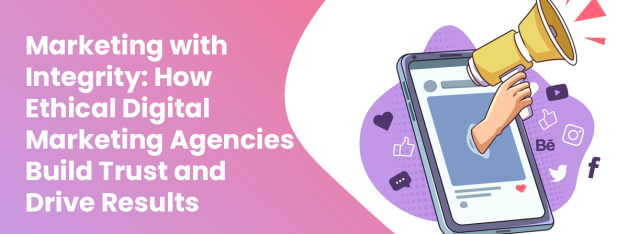Marketing with Integrity: How Ethical Digital Marketing Agencies Build Trust and Drive Results

It does not matter that overnight, with changes in the algorithms, everything changes into another complexity altogether in this digital world of marketing. One element never changes and this is called trust. This simply means not just attracting some customers with loyalty, but also for them building up long term credibility by means of some integral marketing.
Now that search engines and online media are giving more importance to transparency and the rights of the user, ethical marketing is not an ethical decision anymore but a competitive issue. In this blog, knowledge will be shared on why ethical marketing confers sustainable growth, credibility, and ultimately success in getting success in marketing output with honesty, and not guile.
Ethics in Digital Marketing: The Rise
Consumers are today extremely educated. They question the how of brands and demand authenticity in this increasingly conditioned day and age. A recent survey revealed that 87% of customers abhor doing business with companies that seem unfair.
Such companies who do not comply with the standard ethics easily lose the target customers and further demolish the brand name. Ethical marketing activities, which make the business activity responsible, focus on the fact that no trust about a customer can ever be compromised.
Example: Apple’s efforts through its feature called App Tracking Transparency help it to consolidate its brand in a competitive position because it gives importance to consumers’ rights.
Key Ethical Pillars in Digital Marketing
Ethical marketing is not just about avoiding manipulative tactics but also research, transparency, inclusivity, and accountability. The following are the core pillars that ethical digital marketing agencies use:
1. Transparency in Data Collection
Customers must be aware of what their harvested data is being utilized for. Ethical brands need to be clear about the collection process and have options for consumers to opt out.
Case Study: Google’s Privacy Sandbox is a program that deletes third-party cookies and provides alternative business-friendly options where businesses can follow the users’ behaviors.
Takeaway: An informed customer is an empowered customer, which trusts a brand much more.
2. Respect Consumer Privacy
With all the data breaches ever, customer information needs to be safe. Safe transactions and the law about following privacy in ethical marketing.
Example: European companies strictly sticking to the principles of GDPR make the users give specific consent to have their data captured hence earning them that trust.
Pro Tip: Publish your privacy policy on your site as well as in your email marketing campaign.
3. Transparency in Advertisement
A deception culture in advertisement ruins the trust. Ethical marketing is the actual true as well as apt messages about any product that show its real value.
Case Study: Dove’s “Real Beauty” changed the face of beauty ads by not airbrushing anything and, therefore, championed authenticity in ads for beauty care.
Take-away: Consumers value directness. Hyperbole backfires.
4. Avoid Manipulative advertising practices
Other brands use consumer psychology through search engines or through social platforms to force the consumer into doing something he does not want. Ethical marketers avoid dark patterns like creating artificial scarcity and then nicking unsuspecting consumers on the fee.
Example: Amazon has “Only 3 left in stock” displayed overtly. But other stores are presenting it as a false urgency just to make the buyer do impulse.
Pro Tip: Authentic urgency is created when value is added, not trickery.
5. Diversity and Cultural Sensitivity
The marketing campaign today needs to be diverse. Ethical marketing ensures that the ads, the visuals, and the messaging are diverse and culturally sensitive.
Case Study: Nike’s advertising campaigns with all athletes from diverse backgrounds and abilities have helped them grow their global appeal.
Takeaway: Representation matters- customers connect better with brands that embrace inclusivity.
How Ethical Marketing Produces Measurable Results
1. Better Search Engine Rank
Google and other search engines like to rank sites that follow the best practice of ethical SEO, including unique content, good backlinks, and responsive designs.
Case study: Research Degraded through keyword stuffing and clickbait results in a free-fall in ranking; authentic brands remain at top.
2. Customer Retention
Ethical brands manage a long-run relationship with the public, thereby yielding repeat buyers and word-of-mouth advertisement.
Case study: How the sustainability commitment from Patagonia led to customers loyal to their cause and, by extension, the sales on repaired programmes in thrift wear
Take Away: Customers would love to associate with brands which never let go of their ideals
3. Boost Social Media Activations
Customers are drawn towards the brands who are doing well beyond money making. Ethical marketing campaigns working towards natural shares and positive word-of-mouth speak miles.
Pro Tip: Relate your brand’s value in content that does the storytelling and thus touches the emotion.
Steps for Bringing in Ethical Marketing Business
You can be aggressive about implementing these ethics marketing tactics into your organization and follow that launching point.
1. Practice Ethical Marketing Research
- Don’t start with the campaign itself before the whole process of collecting market data upholds all its ethics in their processes.
- Always gather user’s information after he has granted full permission
- Prefer using online surveys and user’s feed backs compared to the rough tracking.
- Be transparent and tell users how exactly their information will be used
2. Set Your Marking Organization Boundaries for Team Ethics
- Set clear policies about marketing through your company to ensure cohesion in all marketing practices.
- Train your marketing people on the ethics of advertising
- Code of conduct for sponsored content and partnership
- Not involve deception tactics
3. Accessibility across Digital Platforms
- Ensure that your messages can reach everyone, including disabled.
- Alt-text image.
- Subtitle video content
- Use colours which would be used to help make it read
4. Consumer Feed-back Monitoring and Adjustment of Strategies
- Check the customers’ feed-backs regularly and adjust the strategies so as to regain their trust.
- Promote giving honest reviews and testimonials from people
- Be transparent regarding complaints and issues always.
- Publish reports which portray one’s commitment toward ethical growth.
Conclusion: Integrity Pays Off in Digital Marketing
An emphasis on such ethical practices within campaigns can reinforce loyalty, which is a great business practice and measurable results based on the programs used.
In the era of the very well-informed consumer, business will thrive in the areas that stand firm on their value. Get ready to be part of the revolutionary shift that will make ethics in marketing the center of your practice? Get started now, and secure the top position on the map in digital trust with your brand.
Frequently Asked Questions About Ethical Digital Marketing
Q: How does ethical marketing impact business growth?
A: Ethical marketing will result in developing more loyal customers, retained customers, and good rank in the search engines.
Q: What are the risks of unethical marketing?
A: Some of the risks of unethical marketing include misleading advertisements, misuse of consumer data, and fraudulent practice that expose companies to legal action, loss of customer base, and reputational loss.
Q: Is ethical marketing possible for small businesses that are financially oppressed?
A: Of course. Ethical marketing is totally possible in small businesses that advocate honest advertisements, transparent policies in the handling of customer data, and good content for everybody.
